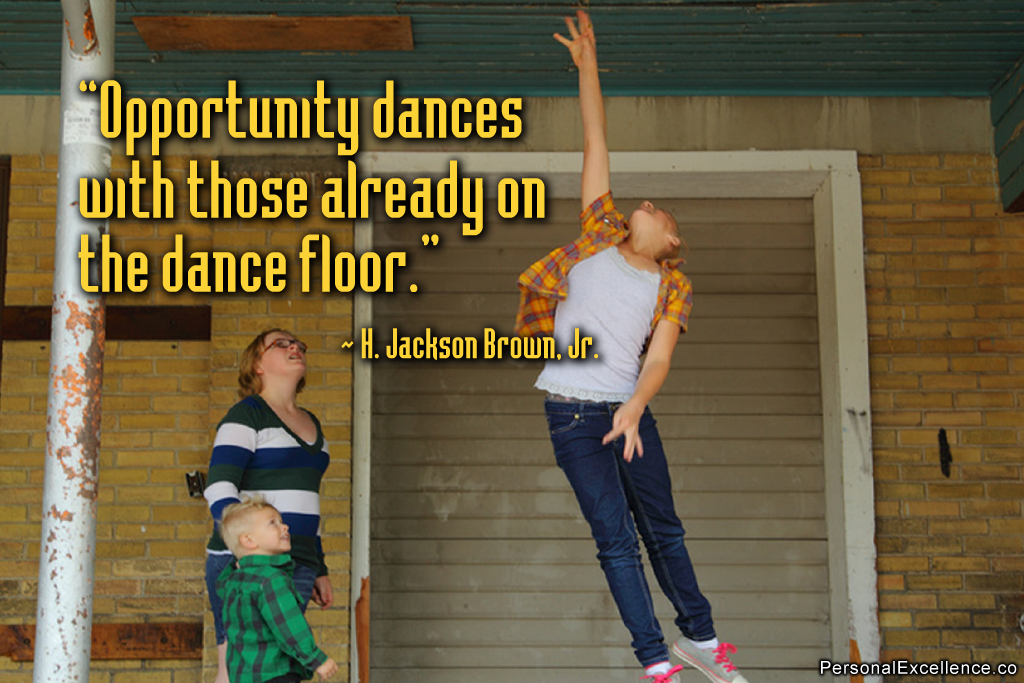
Conventional goal-setting wisdom is to set a goal, create an action plan, and then pursue it. If you fail, revise your targets and try again.
The problem comes when we face goals that can’t be achieved, say due to societal limitations (e.g. you can never repeat senior year of high school with the same batch of classmates) or physical limitations (e.g. age limit to enter competitive swimming). Also, there are times when we don’t progress in a goal despite multiple tries. So does that mean we have failed?
This is where knowing the message of your goal is important. In this episode of The Personal Excellence Podcast, I share:
- What it means to know the message of your goal
- 3 reasons why knowing your message can be that difference between struggling and thriving, being miserable and being happy
- 4 goal scenarios of how to apply this concept — losing weight, building your blog/business, being a professional athlete/performer, and improving your relationship with your family — and how this can relate to you
- 3 questions to ask yourself in any goal pursuit
Listen to the podcast via my online player, Apple Podcasts, Spotify, TuneIn, Amazon Music, or subscribe directly to my RSS feed.
If you've found The Personal Excellence Podcast useful, I'd really appreciate it if you can leave an honest rating and review on iTunes. Your review makes a difference and will help spread the message of conscious living to the world. Thank you!
What is the Message of Your Goal? [Transcript]
Welcome to The Personal Excellence Podcast. The show that’s all about helping you be your best self and live your best life. Now, your host, Celestine Chua!
Celestine Chua: Hey everyone, welcome to The Personal Excellence Podcast Episode 3, I’m Celestine Chua from PersonalExcellence.co.
I want to thank you for listening. We have over 4,000 downloads for the podcast so far which is amazing because we only have two episodes so far so including this is the third one. And we’ve just launched for a few weeks! So I’m so grateful to all of you for tuning in. I’m just looking forward to creating more great episodes for you.
Let’s get to today’s podcast topic and this is a question that I want you to think about, which is: What is the message of your goal?
What do I mean by this? I thought of this topic when I was reading a reader question on my Facebook a week ago. This reader was telling me about his aspiration and ambition — which I think is marvelous — to be a professional football player. He has been facing difficulties along the way and he wanted my advice on the situation. My advice to him was to think about the message behind his goal, which is what I want to talk about today.
So let’s talk about what I mean by “the message behind your goal.”
The Message of Your Goal
Here, message means, for whatever is the goal you want to pursue, what is the reason that you want this goal? What is the intent that you want to make happen?
For example, let’s say I want to improve my relationship with my parents. I want to take them out on a vacation. The message here could be, “I want to better the relationship with them. I want them to be happy.”
So why is it important to discover your message?
The first reason is, think of our goals as one expression of our message. So maybe you want to lose weight. Losing weight is the goal itself. But maybe your message is you want to have a healthier body, you want to live a longer life. So here, losing weight is merely one expression to be healthier. And by knowing this underlying message, you can think about all the other goals that can help you realize this message.
The second reason is some of us get attached to our goals when it is our message we should be loyal to. Let’s say we are facing some immense difficulty in our goal or we lose motivation in a particular goal. Maybe this goal just isn’t compatible with us anymore. But when we are very focused on the goal, we may not be able to see that.
By knowing your message, you can always be checking back with it. Asking yourself, “What I’m doing today, is it a good fit for my message? Is it the truest way to live true to my message? If yes that’s fantastic. If no, what else can I be doing?”
So you’re dynamically living each day to the fullest as opposed to living each day based on some plan you set one month ago. This plan may be a good plan, but maybe you have new ideas along the way.
Let’s look at some examples of how knowing your message can make all that difference when it comes to goal achievement and living our life in general.
Example #1: Losing weight
Let’s take the example of losing weight.
Say you want to lose weight and you want to lose 10 kg (22 pounds) in three months. So you set this plan, you follow through with it, and you do extremely well for the first three days.
And then something happens. This could well be eating something that is out of your diet — a muffin, a cookie. After that, you just feel so bad about it that you binge eat and eat whatever comes your way without even thinking about your diet. And you gain the weight that you lost and maybe some more. How many of you guys can relate to that?
Here there could well be some emotional eating factors coming into play. This is not what we are looking at in this podcast. What we are looking at is the goal itself. Let’s take a step back and think about, why we could be binge eating or eating all these different things even though they are out of our diet.
One possible reason: Because we felt that we have fallen off the wagon. Because we ate that muffin or cookie, that we have jeopardized all our plans to achieve the weight loss of 10 kg (22 pounds) in three months. Since this plan or goal is already jeopardized, that dream is already crushed and it’s not possible to realize that anymore, we feel so upset that we think, What’s the point? I have already jeopardized my goal. So why not just eat whatever I want rather than restricting myself to realize that goal?
But no, this is not the kind of mindset we want. This is where the message comes in. This is where it’s important to understand the message behind why you want to lose weight. So ask yourself: Why do I want to lose weight? Why do I have this goal to lose weight?
Perhaps you’ll get all kinds of reasons like I want to be more attractive, I want to be thinner, I want to be prettier or more handsome, and so on. But know that whenever you get these answers, these are not really the true messages. Continue to ask the question of “Why do I want to lose weight?” until you reach an answer that rings true to your soul.
Maybe after some probing, you get this answer: “I want to lose weight because I want to be healthier. Because I want to have a better body, a healthier body, that allows me to live healthily. To live my day in the best way possible. To live a ripe long life on my own terms.” Or another reason, which was mentioned by one of my course participants in my Anti-Procrastination Course: “I want to lose weight because I deserve it. Because I’m worth it.” This answer can come from because you have not been treating your body and yourself well, and you owe it to yourself to eat healthily and have a good diet.
So it becomes clear that your goal of wanting to lose weight comes from your desire to be healthier. Because you love yourself. Because you deserve that. Whatever you did yesterday or didn’t do yesterday, they’re not as important as you living true to your message right now, being in this present moment, and making this effort to pick food items that resonate with you.
This means that it’s about eating healthily every step of the way. As opposed to getting hung up on this thing that you ate yesterday, muffin or cookie. And after that, feeling so bad that you eat a whole load of muffins, cookies, and cakes, which defeats the purpose of your message.
Know that the binge eating happens because you’re getting hung up on the goal. It doesn’t matter whether you lose 10 kg or 22 pounds in one month or three months or six months or whatever, as much as you being in this moment right now and picking the foods that resonate with you in your journey of being healthy.
Here, think back to your message which is “I want to be healthy. I want to be healthier because I deserve it and I’m worth it.” Then, ask yourself: “What is a meal that I would like to eat that best nourishes my body, that gives me the most nutritional value?”
And you’ll get a whole set of different answers. It could be, say, eating a healthy soup or healthy salad or healthy sandwich as opposed to eating 10 muffins or 10 cookies. Even if you ate something that was out of your diet, mix it up by eating something with less sugar later in the day. Or for the next few days, making sure that your diet is extra clean, as opposed to getting hung up on that one thing that didn’t happen the way you want.
Notice what’s happening here? By focusing on your message (which is to be healthier), you can, at every step of the way, focus on actions that help you to be healthier. Versus being obsessed with that goal which is the weight, losing the weight by a particular date, and so on.
Example #2: Blogging
Now let’s look at example number two which is blogging.
I mentioned blogging because I know a number of you are planning to start blogs or you’re already running blogs or some online platform like YouTube.
But even if you don’t have a blog, that doesn’t matter. You can just think about some project or goal that you’re working on and just replace the statistics that we’re talking about with the relevant metric for your goal.
When it comes to blogging, people get hung up on the statistic. It could be the number of visitors or page views or newsletter subscribers. Let’s say you want to start a YouTube channel, then a common statistic is the number of subscribers to your channel and the total number of views.
It’s very normal that as we build our blog or the YouTube channel, we get upset when we don’t hit the target that we want. Let’s say we want to get 500 visitors a day and we spend weeks or even months creating our platform, creating content, trying to market our work our content and then not really hitting that number at the end of the day.
Maybe we reach a figure that is like 300 visitors a day or even 200. That’s a way off from 500 visitors a day. So we get upset and we wonder, What’s the point? I’m not even hitting my target. I’m trying and working so hard. Might as well just give up. This goal just isn’t for me.
OK but hang on there. This is where you want to take a step back and ask yourself this question: What is my message? What is my reason for working on this goal?
This reason is going to differ from person to person. But perhaps your message is, “I want to create my blog because I want to spread the message of self-love. I want to tell everybody out there how important self-love is. How they’re worth it and they deserve it. And I want to support them in living the best life possible.”
When we get down to this message, it helps put things into perspective because it’s no longer about, “Are you reaching 500 visitors a day? If not, should you give up?” But rather, “Okay. My message is to spread self-love and to help others know about their own worth. So what can I do to best spread this message in the most efficacious way possible?
Here what you want to think about is, “Okay, with my message in hand, let’s evaluate: The plans, the action steps I’ve been taking so far, are they in line with my message to spread self-love? And for the number of people that I’ve reached out to so far, let’s say you’re getting 200 visitors a day. Are these not people?”
They are, right? I mean the very fact that they have landed on your website and read some material or another, that means that they have in one small capacity or another been touched by your material.
So you are already making so much progress in your message. Now it’s about thinking further, like, “How else can I spread this message to more people? How else can I live true to my message of spreading self-love and self-worth to others?”
As opposed to being obsessed and thinking, “Oh I’m not reaching 500 visitors visits a day. I’m just reaching 200 visitors a day. I suck. This is not for me. I’m a terrible person. I’m going to just stop working on this goal altogether.”
What you want is to focus on your message and to know that whatever figures and stats you’re reaching for — which are important by the way; it’s important to be stats and metrics-focus in your goal — but remember that these are just milestones that you are setting for yourself as you realize your message.
Example #3: Improve relationship with your parents
So now let’s look at the third example. Let’s say you want to improve your relationship with your parents and you want to get them to a vacation.
The problem is that they just say no even though you are making all the arrangements you are even offering to pay. And it could be for whatever reason they want to save money, they don’t care, they’re not interested. But it’s just a big fat NO.
After much persistence and trying, you get frustrated. You think, Why are they trying to reject me? Can’t they see all the effort I’m putting in? Why can’t they just go on this vacation so they all of us can enjoy some time away and spend time as a family?
Maybe you take it as a rejection of yourself. But this is where you want to take a step back and think about, Why do I want to bring my parents on a vacation? Why is the message behind the goal?
Perhaps you’ll get a message like “I want to bring my parents on a vacation because I want to give them what’s best. Because I want to spend more time with them. Because I want to tell them that I love them and this is my way of loving them. Of giving them something good.”
So then, the question comes down to this: Forcing them to go on a vacation despite them not wanting to… Would this really be loving them? Not really, right? I mean if they don’t want to go on a vacation, then they don’t want to. Why force them? Why make them do something they don’t want? Rather, by focusing on this underlying message — which is loving your parents, wanting to spend more time with them, wanting to simply improve your relationship and your connection with them — then you start thinking, What are all the other things I can do to have a better relationship with them? To express my love to them?
This can be simply spending more time with them. Making a point to have dinner with them once or a few times a week. Doing little simple acts of kindness for them and it can be cooking up a meal, buying something that they like (and this can be a favorite snack or food that they like), calling them every few days just to check on them and to tell them that you love them.
If your family doesn’t have this practice or habit of saying I love you because it’s icky and mushy, then just simply asking some questions of care and concern. And they will receive it. They will know and understand that you’re making this effort to improve the relationship. And I’m telling you they will know that and they will appreciate it. Even if not right now, but at some point in the future. And you’ll start to see that they will start reciprocating as well in terms of their efforts and actions to you.
Here what we’re doing is again getting down to your underlying message such that you’re approaching your goal in the most authentic way possible. And thinking about all these different goals that are relevant to your message versus being so hung up and fixated on a particular goal which may well not be relevant or true to you anymore.
Example #4: To compete for a position with limited slots
Let’s get to our last example which is to become a professional rugby player or some kind of profession or role where only a very select number of slots or positions are available for a huge pool of candidates.
For the context of this discussion, the goal is to be a professional rugby player. So you want to play on the national team. You want to represent the country and compete with all these countries around the world.
And you train super hard. You train for months and months. Along the way, you do get some positive results. First, you get elected at the school level. Then you represent the school. And then you make the shortlist for the national team. But for one reason or another, you don’t make the cut in the end.
What happens now? Is it the end of life as we know it? Is it the end of your goals and dreams?
Of course not, right? The problem when it comes to aiming for a goal when there’s only a few positions for a huge pool of candidates, is that there can well be thousands upon thousands of highly talented individuals. But because there are only a few positions for all these people, only a few people can be selected. Regardless of the amazing talent of every single person trying to apply for it.
This doesn’t mean that you don’t go for goals where only one or few people can be selected. No. This doesn’t mean that at all.
Such goals can be wanting to become a professional rugby player. It can be say auditioning for a talent show like American Idol which has already ended, but any talent show, singing show, dancing show, and so on. It can be say vying for a job position which is highly competitive.
So continuing to go for these goals. But understand what is your underlying message behind wanting that goal.
In the context of wanting to be a professional rugby player, maybe your message is to showcase your talents to the world. To let others know your amazing ability because you want to show that you can do it. That you have all this potential that you are ready to unleash to the world.
And it’s just that at that particular point, being a professional rugby player seemed like the most viable outlet for you to realize this message. But when you get down to the message, it is clear that it’s not just by being a professional rugby player or say winning this particular talent contest or by getting this particular job in this highly reputable company where you can realize this message. This message can be realized through many different outlets. Of course, you’ll need to brainstorm and think, OK what are these different outlets where I can realize this message in the best possible way?
But here it’s about understanding that this is not the only way you can make your message happen. You can make this message happen in so many different ways, so many different outlets and possibilities, and it’s about looking out there. Versus being hung up on just one particular way to make this message happen, which may well not be relevant or true after a certain period of time.
Maybe you go deep into the goal and you realize, “This goal doesn’t really resonate with me.” Or you go into this goal and you realize, “Oh there are other goals that are a better fit for my message.” Or maybe, “Oh this goal is a great fit. But so is goal number two and goal number three. I can work on all three goals simultaneously.”
To You
So to you: I have three questions that I want you to think about:
- What is a goal you’re working on?
- What is your message behind this goal?
- Every time you are working on this goal, from now on, I want you to think:
- Is this, what I’m doing, relevant to my message?
- Can I realize my message in a better way on top of what I’m currently doing?
- Is there any need to refresh on the goals that I’m working on now? And to take on new goals or to look at new goals?
Sometimes you hit a roadblock with your goal. Maybe this goal simply isn’t compatible, in which case it’s about setting a new goal that aligns with your message.
Or maybe you hit a roadblock and this road block is something you have to overcome. And the goal is still true to your message.
But knowing your message helps put things into perspective. Because as opposed to being so obsessed with and so focused on the frustration behind this little roadblock, then it’s simply about taking things into stride, overcoming whatever hurdles are there, while focusing on and staying true to your message every step of the way.
Your Message → Many Goals, Many Mediums
Remember your goal is simply one expression of the message you want to realize and your message can manifest in many different ways.
By knowing what your message is as opposed to being so obsessed with and focused on the goal itself, you can now open yourself up to all these different ways and channels in which your message can be realized.
This is when you are truly living in the present moment and living your life in the most authentic way that’s truest to you, while making every day the best that it can be.
Closing Note
So that’s it for today’s episode. Thank you so much for listening.
I just want to let you know that I’m truly grateful to you for being here for supporting my work. I’m really committed and looking forward to creating more great content for you guys. Thank you so much and I look forward to speaking to you guys in the next episode. Bye guys!
Endnote: Thanks for listening to The Personal Excellence Podcast! For more tips on how to live your best life, visit www.personalexcellence.co
Related Resources:
(Image: John Gateley)







![How Many Times Should You Try? [Infographic]](https://personalexcellence.co/files/infographic-failure-200x157.png)
 Thanks for reading. If you like my free articles, join my private email list and get my latest updates and articles sent right to your inbox.
Thanks for reading. If you like my free articles, join my private email list and get my latest updates and articles sent right to your inbox.